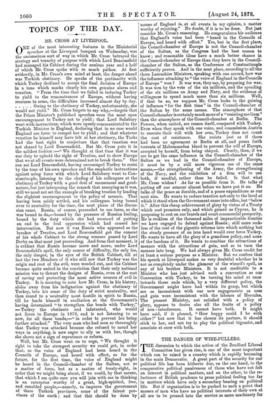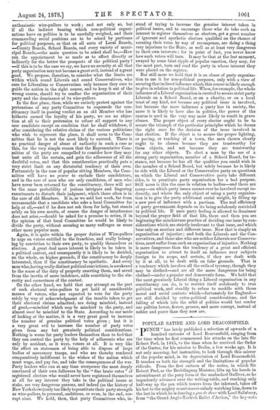THE DANGER OF WIRE-PULLERS.
rrHE discussion to which the action of the Bradford Liberal Committee has given rise, is one of the most important which can be raised in a country which is rapidly becoming in the main Democratic. A great part of the security for our political life has been hitherto due, on the one hand, to the comparative political passiveness of those who have not felt an interest in political matters, and on the other, to the re- luctance of British prudence to press political feeling too far in matters which have only a secondary bearing on political life. But if organisation is to be pushed to such a point that masses of men who have no political interests of their own at all are to be pressed into the service as mere machinery for enthusiastic wire-pullers to work ; and not only so, but if all the indirect bearing which non-political organi- sations have on politics is to be carefully weighed, and their commanding social positions are to be seized by partisans for political purposes, so that on all sorts of Local Boards, —County Boards, School Boards, and every variety of muni- cipal Boards,—the main question to be asked shall be,—How can the appointment be so made as to affect directly or indirectly for the better the prospects of the political party ? —if this is to be the case we say, we have no security at all that party organisation may not become a great evil, instead of a great good. We propose, therefore, to consider what the limits are within which sound Liberals and sound Conservatives, who care for Liberalism or Conservatism only because they care to guide the nation in the right course, and to keep it out of the wrong course, should try to confine the organisation of their party and the dominance of its wire-pullers. In the first place, then, while we entirely protest against the pretensions of any party Committee to supersede the con- stituency itself in passing verdict on an old Member who has hitherto earned the loyalty of his party, we see no objec- tion at all to their pretension to refuse all support to any new candidate except on condition that he shall withdraw, if after considering the relative claims of the various politicians who wish to represent the place, it shall seem to the Com- mittee that he is not the most likely to succeed. There is no practical danger of abuse of authority in such a case as This, for the very simple reason that the Representative Com- mittee of the party are compelled to consider how they may best unite all the certain, and gain the adherence of all the -doubtful votes, and that this consideration practically puts a very strict limit on any dictatorial tendency of their own. Fortunately in the case of popular sitting Members, the Com- mittee will have no power to exclude their candidature, and in the case of men who are only candidates, of men who have never been returned for the constituency, there will not be the same probability of jealous intrigues and lingering resentments to disturb their judgment, which there often is in the case of old Members. It is, as we said last week, far from unreasonable that a candidate who asks a local Committee for help at all,—and if he does not ask them for help, but stands solely on his own merits, of course the danger of interference noes not arise,—should be asked for a promise to retire, if in the opinion of that local Committee he would be likely to 'divide the party, without securing so many suffrages as some other more popular man. Again, it is quite within the proper duties of Wire-pullers to urge on voters entitled to the franchise, and really belong- ing by conviction to their own party, to qualify themselves as electors. A great deal more interest is likely to be taken in a political contest, and consequently it is likely to be decided, on the whole, on higher grounds, if the constituency be deeply interested, than if the constituency be apathetic. And every man who, having really distinct political convictions, is awakened to the sense of the duty of properly asserting them, and saved from the inertia of mere indolence, adds something to the sin- cerity and earnestness of the contest. On the other hand, we hold that any attempt on the part of such electoral wire-pullers to get hold of considerable masses of voters, who are expected to vote for the party solely by way of acknowledgment of the trouble taken to get their electoral claims admitted, are doing mischief, instead of good,—mischief which may be mischief to the party, and almost must be mischief to the State. According to our mode of looking at the matter, it is a very great good to increase the number of genuine political votes given ; but it is a very great evil to increase the number of party votes given from any but genuinely political considerations. Nothing is worse for party leaders themselves than to feel that they can control the party by the help of adherents who are only by accident, as it were, voters at all. It is very like the effect on statesmen of being able to dispose of large bodies of mercenary troops and who are thereby rendered comparatively indifferent to the wishes of the nation which must wage, and pay for, and take the consequences of the war. Party leaders who can at any time overpower the most deeply convinced of their own followers by the "fine brute votes" of registered electors who would never have registered themselves at all for any interest they take in the political issues at stake, are very dangerous persons, and indeed (as the history of New York shows) only too likely to prostitute their party strength as wire-pullers, to personal, ambitious, or even, in the end, cor- rupt aims. We hold, then, that party Committees who, in- stead of trying to increase the genuine interest taken in political issues, and to encourage those who do take such an interest to register themselves as electors, get a great number of ignorant and apathetic electors qualified on the chance of securing their votes by way of recompense, are doing a thing very injurious to the State, as well as at least very dangerous to their own interests ; for in point of fact, you never know how such voters will turn. It may be that at the last moment, swayed by some faint ripple of popular emotion, they may, for the most part, turn and rend the party in whose interest they were placed on the register.
But still more we hold that it is an abuse of party organisa- tion to use it for non-political purposes, only with a view of securing that indirect influence which this course is likely enough to give in relation to political life. When, for example, the whole influence of a Liberal organisation is exerted to secure strict party Liberals on a School Board, or on a charity, or on a local trust of any kind, not because any political issue is involved, but because the more influence a party has in society, the more it is likely to have also in politics, the power of the caucus is used in the very way most likely to result in grave abuses. The proper object of every elector ought to be to secure the triumph of the particular principles which he deems the right ones for the decision of the issue involved in that election. If the object is to secure the proper lighting, or paving, or teaching of a town, the men chosen clearly ought to be chosen because they are trustworthy for these objects, and not because they are trustworthy for any other objects. To elect a man by the use of a strong party organisation, member of a School Board, for in- stance, not because he has all the qualities you could wish in the member of a School Board, but solely because he is likely to side with the Liberal or the Conservative party on questions on which the Liberal and Conservative party take different sides, is to prostitute party organisation for a bad purpose. Still more is this the case in relation to bodies—and there are many—on which party issues cannot ever be involved except in- directly, and where the only object of using a party organisa- tion is to give the party additional social weight, by filling up a new post of influence with a partisan. The real efficiency of party government depends on its being sedulously restricted to political life. If once party feeling is allowed to domineer beyond the proper field of that life, there and then you are beginning the mischievous practice of deciding one issue by con- siderations which are strictly irrelevant to that issue, and which bear only on another and different issue. Now that is simply an organisation of injustice ; and both the Liberals and the Con- servatives, and those also who are neither Liberals nor Conserva- tives,must suffer from such an organisation of injustice. Nothing is more dangerous than the tendency of a great and efficient organisation to attract to itself an influence over subjects foreign to its scope, and certain, if they are dealt with by it at all, to be dealt with on false grounds. That is a tendency which involves all the evils of tyranny, though they may be clothed—and are all the more dangerous for being clothed—under a popular and democratic form. We hold that the most genuinely Liberal thing a Liberal organisation in any constituency can do, is to restrict itself sedulously to true political work, and steadily to refuse to meddle with those moral and social contests which—fortunately for England— are still decided by extra-political considerations, and the falling of which into the orbit of politics would but render our politics lower, fiercer, grosser, and more corrupt, instead of nobler and purer than they now are.































 Previous page
Previous page